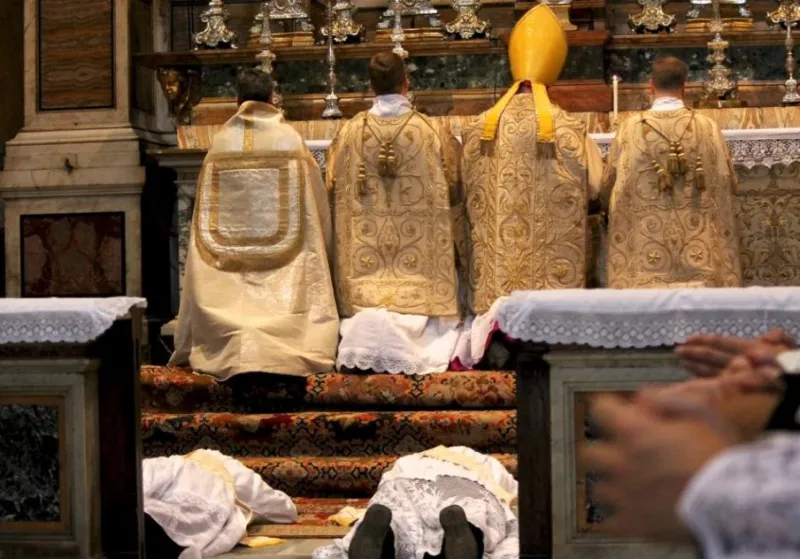
Rome Newsroom, Jan 5, 2024 / 13:45 pm (CNA).
Bishop Peter Shao Zhumin of the Diocese of Wenzhou in the eastern region of Zhejiang, China, was arrested by Chinese security forces on Jan. 2, according to a report by AsiaNews.
During his arrest, the bishop was, according to an AsiaNews source, instructed to “take clothes for spring, summer, autumn, and winter,” indicating that his detention will be for a prolonged period of time.
As is often the case when senior clergy are detained, the exact location of the bishop’s detention is unknown.
The report went on to speculate that the reason for his arrest resulted from a letter he wrote to the state-approved diocesan administrator in which the bishop expressed his dismay over changes made in the diocese without his consent.
Shao was ordained a priest in 1989 and was made coadjutor bishop of Wenzhou by papal mandate on Nov. 10, 2011. His appointment took place during a period that marked a low point in Sino-Vatican relations when there were a series of illicit episcopal consecrations without the approval of the Apostolic See.
In 2016 he was made bishop of the diocese following the death of Bishop Vincent Zhu Wei-Fang. Chinese authorities have refused to recognize his ordination and ministry as bishop and placed Father Ma Xianshi as diocesan administer because of Shao’s refusal to join the state-organized bodies governing the Church in China.
The 61-year-old prelate has been subject to frequent harassment, arrest, and detention by Chinese authorities for his refusal to legitimize the state-run Church and its affiliated organs, such as the Bishops’ Conference of the Catholic Church in China (BCCCC) and the Chinese Catholic Patriotic Association (CCPA), to the consternation of local authorities and state-affiliated clergy.
Shao was last detained in February 2023 along with his personal secretary, Father Paolo Jiang Sunian, in a move that was interpreted as an attempt to prevent them from attending the funeral of underground priest Father Leo Chen Nailiang.
Prior to that he was detained in October 2021 and released two weeks later, AsiaNews reported. According to ChinaAid, between his appointment and 2018, he was detained on five separate occasions before being forcibly relocated by authorities in 2018.
To date, the Holy See Press Office has not issued a statement on Shao’s most recent arrest. However, the Vatican issued a statement in 2017 stating that it was “observing with grave concern the personal situation of Bishop Peter Shao Zhumin of Wenzhou, forcibly removed from his episcopal see some time ago.”
In 2018 the People’s Republic of China and the Holy See signed their landmark accord that concerned the appointment of bishops on the mainland. While the exact provisions of the deal have not been made public, it has been disclosed that there is a power-sharing agreement in place where consent is needed by both the Chinese government and the Holy Father for an episcopal ordination to proceed.
The signing of the deal has also had the ancillary effect of uniting the underground and patriotic churches, a distinction that dates back to the 1950s, into full communion with Rome. The provisional agreement was first renewed in 2018 and again in 2020. It will be up for renewal for a third time in October 2024.
Despite the signing of the Sino-Vatican Accord, Chinese authorities have continued to harass clergy who refuse to register with the bodies that oversee religious activity in China, such as the CCPA.
In May 2023, the National Religious Affairs Administration (NRAA), formerly known as the SARA, which is under the direct control of the United Front Work Department (UFWD) and thus the Chinese Communist Party’s Central Committee, launched a database for clergy to register with the government. Registration is compulsory and any clergy member who refuses is subject to fines and even prison sentences.
The Diocese of Wenzhou is located in the Eastern coastal province of Zhejiang and holds a symbolic meaning for Chinese Christians. Known as the Jerusalem of the East, it saw a massive growth in the Christian population in the 19th century due to the influx of Protestant missionaries in the 19th century and remains one of the largest Christian urban centers in the country.
If you value the news and views Catholic World Report provides, please consider donating to support our efforts. Your contribution will help us continue to make CWR available to all readers worldwide for free, without a subscription. Thank you for your generosity!
Click here for more information on donating to CWR. Click here to sign up for our newsletter.





The Chinese security forces are skillful at accompanying Bishop Peter Shao Zhumin with closeness.
Ah, the fruits of Synodaling…